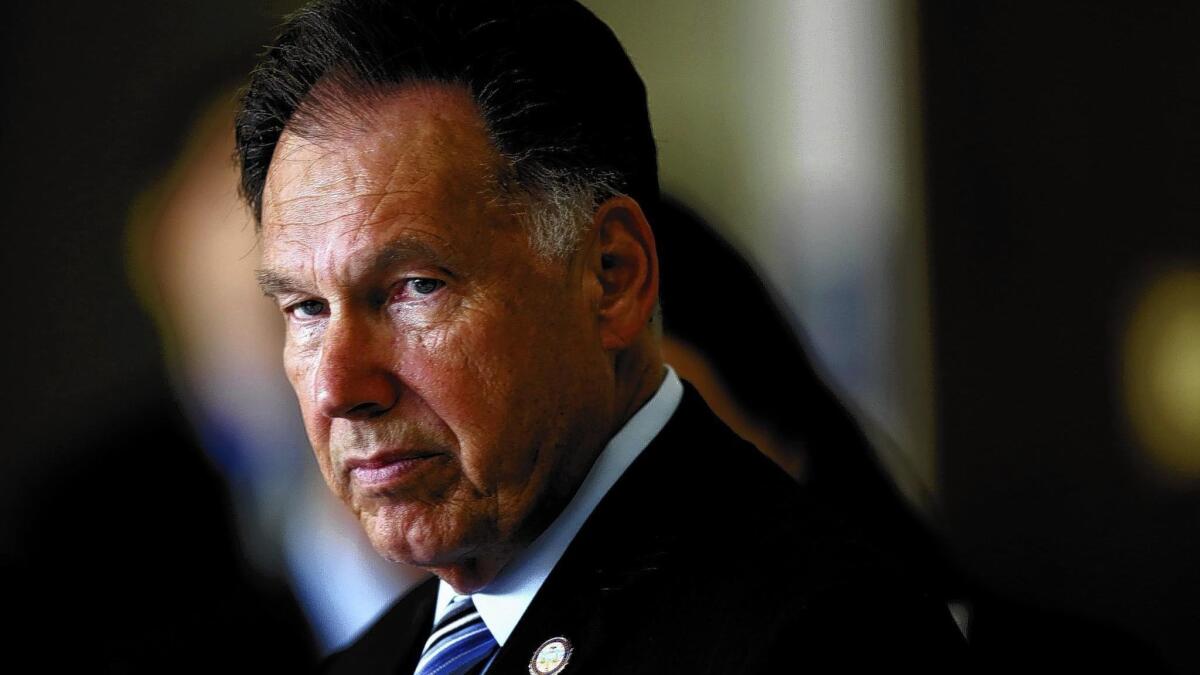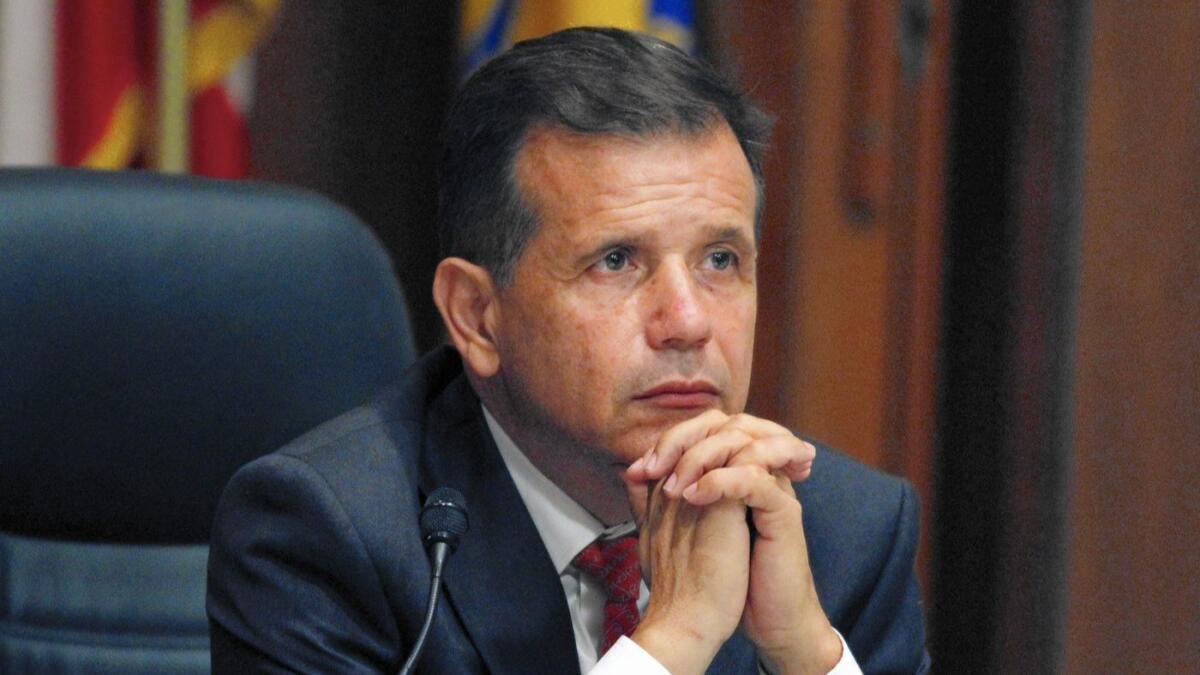O.C. anti-corruption task force collapsed amid infighting between federal and local investigators

Back in 2013, Orange County’s top prosecutor and federal authorities set up a task force to root out local political corruption.
The timing seemed appropriate: A grand jury report had recently declared that misconduct was “actively festering” in the county’s halls of government. And the district attorney’s office was receiving a growing number of public integrity complaints.
The creation of the Orange County Corruption Task Force and its work were shrouded in secrecy. But nearly four years after it began, the joint operation quietly fell apart last year amid conflicts between local and federal investigators who had little to show for their work together, according to a Los Angeles Times investigation.
About a dozen law enforcement sources recently provided details to the newspaper about the bad blood and the breakup.
Federal agents, they said, harbored suspicions about supervisors in the D.A.’s office seeking information about separate FBI corruption investigations. And officials clashed over separate inquiries into the mayor of Santa Ana, including a plan by D.A.’s investigators to use information from a federal informant to obtain a search warrant for their own case.
The tensions came to a head when Dist. Atty. Tony Rackauckas sent federal authorities a letter withdrawing from the operation, complaining that his office had been “threatened with ‘Obstruction of Justice’ violations.”
Rackauckas’ decision came weeks after the Justice Department announced that it was investigating whether his office had engaged in a “pattern or practice” of violating defendants’ constitutional rights by misusing jailhouse informants. A few months later, Rackauckas’ former top investigator filed a legal claim accusing the district attorney of interfering in corruption inquiries into his political allies. Rackauckas has denied the allegations.
It is unclear how many cases the task force investigated during its existence.
The district attorney’s office declined interview requests from The Times or to say what cases the task force investigated. A statement provided by a D.A.’s spokeswoman said the office takes public corruption cases seriously and continues “to maintain a positive relationship” with the FBI, conducting “joint investigations on corruption, terrorism and other cases.”
FBI spokeswoman Laura Eimiller confirmed the task force had ended. She said she could identify only one task force case — the bribery prosecution of an Orange County court clerk convicted of fixing tickets. In announcing the charges in 2016, the U.S. attorney’s office credited only FBI and Internal Revenue Service agents, not the district attorney’s office, even though a D.A.’s investigator and prosecutor worked on the case.
Eimiller said federal agents assigned to the task force worked separately on several other investigations, including the case against a hospital operator convicted of paying doctors millions of dollars in kickbacks for patient referrals.
The end of the task force marks the latest setback in a county where attempts to target corruption have often run into apathy or outright resistance from political leaders.
The county’s Board of Supervisors balked at creating a specialized public integrity unit within the district attorney’s office and initially dismissed calls from the grand jury to set up an independent watchdog agency to police political activities. A bright spot for reformers came in 2016 when the board relented and put the idea of an ethics commission to voters, who overwhelmingly approved the idea. But the new panel is not set up to be as aggressive as a similar commission that Los Angeles city voters created more than a quarter-century ago.
Jodi Balma, a professor of political science at Fullerton College, noted that while Rackauckas’ office has brought charges against some low-level government officials, it took federal authorities to swoop in and convict ex-Sheriff Mike Carona on charges of witness tampering — the biggest corruption case Orange County has seen in more than a decade.
The task force’s collapse, Balma said, “reinforces what those who walk an ethical fine line already believe — which is there are no consequences for unethical behavior in Orange County.”
Rackuackas, who is running for a sixth term as the county’s top prosecutor, was elected in 1998 after his predecessor, Mike Capizzi, provoked sharp criticism from the county GOP over his aggressive investigations of local politicians. Rackauckas campaigned in part by arguing that such cases take away resources from more important types of crimes and are better left for administrative citations by the state.
Multiple sources said both federal and local officials deserve blame for not taking public corruption cases seriously enough and for failing to assign enough of their best investigators and prosecutors to work on the task force. The sources spoke on condition of anonymity to avoid undermining their ongoing relationships with the agencies that were part of the operation.
Federal officials on the task force were suspicious from the outset about the motives of the district attorney, whom they viewed as having close political ties with potential targets, according to the sources.
“When you have local elected officials at a D.A.’s office and they’re naturally involved in politics — that’s what they do — can they effectively investigate and be involved in those investigations?” one federal official asked. “It’s not a good fit.”
Within the task force, friction between the district attorney’s office and federal investigators grew over their separate inquiries into Santa Ana Mayor Miguel Pulido, according to local and federal law enforcement sources.
In 2013, after an expose by a local news outlet, the district attorney’s office began investigating Pulido in connection with a land swap deal in which a city contractor traded a small parking lot the mayor and his family owned for a house in Westminster worth more than double the fair market value of the lot. The company, a local auto parts store, later received a $1.35-million no-bid contract to be the sole provider of auto parts for the city.
The FBI allowed the D.A.’s office to take the lead on the investigation, according to federal sources familiar with the inquiry.
The D.A.’s office ultimately cleared Pulido of criminal wrongdoing, but its joint investigation with the Fair Political Practices Commission led the state agency to fine him $13,000 for violating California’s Political Reform Act. The violations included not disclosing the real estate transaction on public statements of economic interest and an illegal vote for a contract with the vendor.
The next month, a medical marijuana collective filed a lawsuit claiming that Pulido and other city officials had accepted “currency” and gifts from pot dispensaries, that Pulido had a “pecuniary or membership interest” in at least one such business and that he and other city officials had directed police actions to shut down the competition to these shops.
A judge later dismissed Pulido from the suit, but the D.A.’s office launched an investigation into whether he had received money from collectives, according to sources familiar with the inquiry. (The city’s police chief later said in a civil lawsuit he filed against the city that he reported similar allegations about Pulido to Rackauckas’ office.)
Meanwhile, the FBI had a separate inquiry into whether Pulido was accepting money from another local business, the sources said. As D.A.’s investigators prepared to obtain a search warrant in their case, they approached the FBI and asked about information that an informant had provided the bureau about Pulido, according to one of the federal sources. FBI agents viewed the request as encroaching on their own inquiry, the source said.
Pulido has previously denied accusations of wrongdoing and has not been charged. He did not respond to requests for comment for this article.

On Feb. 1, 2017, Rackauckas wrote to then-U.S. Atty. Eileen Decker, FBI Assistant Director Deirdre Fike and IRS special agent in charge Anthony Orlando giving notice that his office was ending its participation in the task force.
In the letter, a copy of which was obtained by The Times, Rackauckas complained that the “IRS never joined the task force and has refused to share information related to joint investigations.”
He said his investigators had delayed seeking a search warrant in a significant investigation for two months during which “we have been asked to wait for the IRS and FBI to develop different leads.” The search warrant, which was never executed, was related to the D.A.’s new Pulido investigation, according to a federal law enforcement source familiar with the matter.
Read Tony Rackauckaus’ letter withdrawing from the task force »
Without explanation, district attorney’s officials were then asked to end their investigation, he said.
“Instead of exchanging the information as outlined in the [task force’s memorandum of understanding], our office was threatened with ‘Obstruction of Justice’ violations if we chose to move forward with our case,” he wrote. He did not identify who made the threat.
“The core strategy of any task force is to develop synergy, efficiency and effectiveness,” Rackauckas wrote. “Recently, it has not been possible due to the lack of willingness by certain agencies to share information and build the best possible case.”
Federal law enforcement sources acknowledged the conflict but were divided over whether anyone had threatened obstruction of justice charges. One said a supervising FBI agent had warned a district attorney’s investigator that continuing with the Pulido inquiry would obstruct the separate federal investigation into the mayor but didn’t explicitly warn of criminal charges.
The Orange County task force’s problems stand in stark contrast to the success of a similar joint operation farther east. The Inland Regional Corruption Task Force — which includes federal agencies and the district attorney’s offices in Riverside and San Bernardino counties — has helped prosecute elected officials throughout the region.
In 2013, that task force’s work led to the conviction of a Moreno city councilman who accepted a $2.36-million bribe from an FBI operative posing as a real estate broker, the largest bribe ever given to a public official during an undercover operation, authorities said.
In announcing Marcelo Co’s guilty plea, federal and Riverside County prosecutors attributed the result to “seamless collaboration” between agencies on the task force, “whose members share a mission of rooting out corruption across the Inland Empire.”
More to Read
Sign up for Essential California
The most important California stories and recommendations in your inbox every morning.
You may occasionally receive promotional content from the Los Angeles Times.











